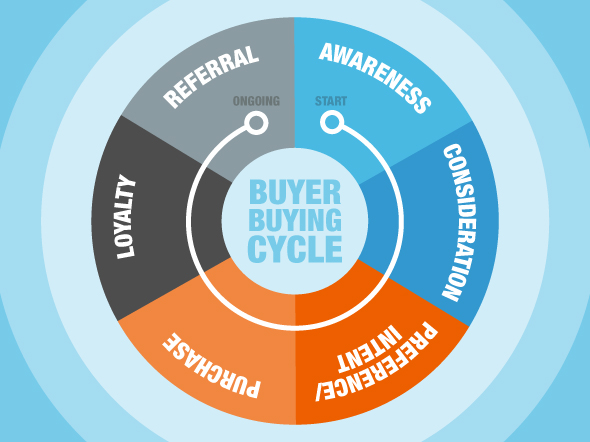Back to B2B Buying-Cycle Basics
01.13.16 · Greteman Group
Every business needs a steady, dependable customer-pipeline flow. Whether you’re introducing a new aircraft or delivering a tried-and-true service, consider the interim stage your customers and prospects are in. And think about what you’re doing to advance them to the next stage.
Create a seamless experience. Particularly in B2B, you may need to nurture prospects for years before converting them to loyal, referral-making customers. This has gotten increasingly challenging with many internal marketing staffs reduced – yet expected to attend more tradeshows, to manage ever-proliferating digital channels, to beat out ever-greater competition, and to make your outreach increasingly personal and tailored. Today’s customers demand nothing less.
Awareness – Make people aware of what you offer – and what problem you can solve for them or how you can make their lives better. You can use a combination of pull and push marketing. Pull examples include search-engine optimization (SEO) and pay-per-click (PPC) so people find you when they’re searching for solutions but may not even know your name. Thought leadership (as in blogs and industry publications) and news coverage also serve to pull people to you. Push examples include print and digital advertising and direct mail. Forrester Research has reported that the ratio of found or researched content (pull) to marketing or sales pieces (pull) is about 3 to 1 for today’s B2B buyer. Look at your spending for 2016. If you’re allotting 75% of your marketing budget to paid media and only 25% to earned media, you might want to rethink that.
Consideration – Today’s buyers are much savvier about researching buying options, have more data at their disposable than ever before, and are increasingly connected. Help people evaluate your unique value proposition. Don’t have one? Uncover it. Or create it. Develop targeted content that directly addresses your prospects’ hot buttons. More range. Greater speed. A better value. Whatever it might be. Make sure this is prominently placed on your website and that you use search-engine optimization (SEO) to help folks find it. Infographics with competitive data provide a great, at-a-glance way to make your point, especially today when you can add movement and interactivity. Dynamic graphics give your prospects something to share with others on their team. Preferably with a statement such as this: “Hey, Bill, this really convinces me we ought to be using this service. What do you think?”
Preference – You may sway buyers through logic or emotion or a combination of the two. Consider all the channels available to you, particularly for aviation’s highly mobile target audiences. CEOs, directors of flight departments, pilots and maintenance technicians evaluate options on their smartphones and tablets as much or more as on their desktops. Use the right channels for your message, offline or online. Face to face at an event or in someone’s inbox or mailbox.
Purchase – Overcome the barriers to buying by presenting your offer as simply as possible. Remove (or at least break down) complexity. Marketing automation can be key by helping you first capture then leverage buyer behavior so you know what content prospects are consuming and helps you predict what they will do next. This lets you provide relevant, timely content for an improved customer experience that increases sales.
Loyalty – Keep close to your customers so they continue to be customers. Communicate regularly with updates and news that would be of interest. Sales are not one and done. They are ongoing. You must continually sell yourself to customers. Keep them up to date on industry best practices. Remind them why they first chose you and make them glad they did. Marketing today is less about campaigns built around products and their features and more about engagement, how you meet customers’ needs.
Referral – Nothing beats the enthusiastic recommendation of a trusted peer. Make it easy for your customers to convert others to your brand – or, to put it more bluntly, to buy what you sell. Offer digital (easily found) content that can be shared from anywhere, anytime to anyone. This is marketing at its best. When customers so love your product/service, they want others within their sphere of influence to use it, too. And they’re willing to speak out on your behalf. Another reason this is so great: one recent B2B study reports 53 percent of respondents say they rely on peer recommendations.
As 2016 revs up, go forth and market in ways that streamline the buying process, create more sales-ready leads for you and generate more satisfied, loyal customers.
This column ran in the January 14 issue of BlueSky Business Aviation News.
